Americans largely have positive feelings about the role religion plays in American life. A slim majority of U.S. adults say religious organizations do more good than harm in American society, while just one-in-five say they do more harm than good. Specifically, roughly half of Americans give religious organizations high marks when it comes to strengthening morality and bringing people together.
But U.S. adults draw the line when it comes to politics: More than six-in-ten say churches and other houses of worship should not express their views on day-to-day social and political matters, and three-quarters say religious organizations should not endorse candidates for office.
Members of different religious traditions differ on these questions. For example, compared with members of other groups, evangelical Protestants express relatively high levels of support for religion in politics. A slim majority of evangelical Protestants say churches should express their views on political matters, and about half say that religious organizations do not have enough influence in politics. But even among evangelical Protestants, most say churches should not endorse candidates.
Among religiously unaffiliated Americans (those who say they are atheist, agnostic or “nothing in particular,” sometimes called religious “nones”), most say religious institutions have too much influence on politics, and that religious conservatives have too much control over the Republican Party.
This chapter also includes an analysis by religious group of several questions about how friendly various institutions are toward religion. Most Republicans say the Democratic Party, university professors, and reporters and the news media are unfriendly to religion.
Many Americans say churches and religious organizations strengthen morality in society, bring people together
Most Christians see religion as a force for good in American life. Two-thirds of Christians say that churches and other religious organizations strengthen morality in society (67%), and 64% say they mostly bring people together. Seven-in-ten say that, overall, religious organizations do more good than harm in American society. Positive views of religion’s impact on American life are especially common among evangelical Protestants, but majorities in all Christian groups analyzed see religion’s influence as more positive than negative in these ways.
The views of U.S. Jews and the religiously unaffiliated are decidedly more mixed. For instance, while roughly four-in-ten Jews (42%) say religious organizations strengthen morality, a similar share (39%) say they do not make much difference in this regard and one-in-five (19%) say religious organizations weaken morality in American society. Among the religiously unaffiliated, those who say that religion does more harm than good outnumber those who say it does more good than harm (39% vs. 31%). Self-identified atheists are especially negative toward religion: 64% say religious organizations mostly push people apart (rather than bring people together), and 70% of U.S. atheists say that, overall, religion does more harm than good in American life.
Older adults generally express more positive views of religious organizations than do younger people, though across all age groups, larger shares express a positive view of religious organizations than a negative one.
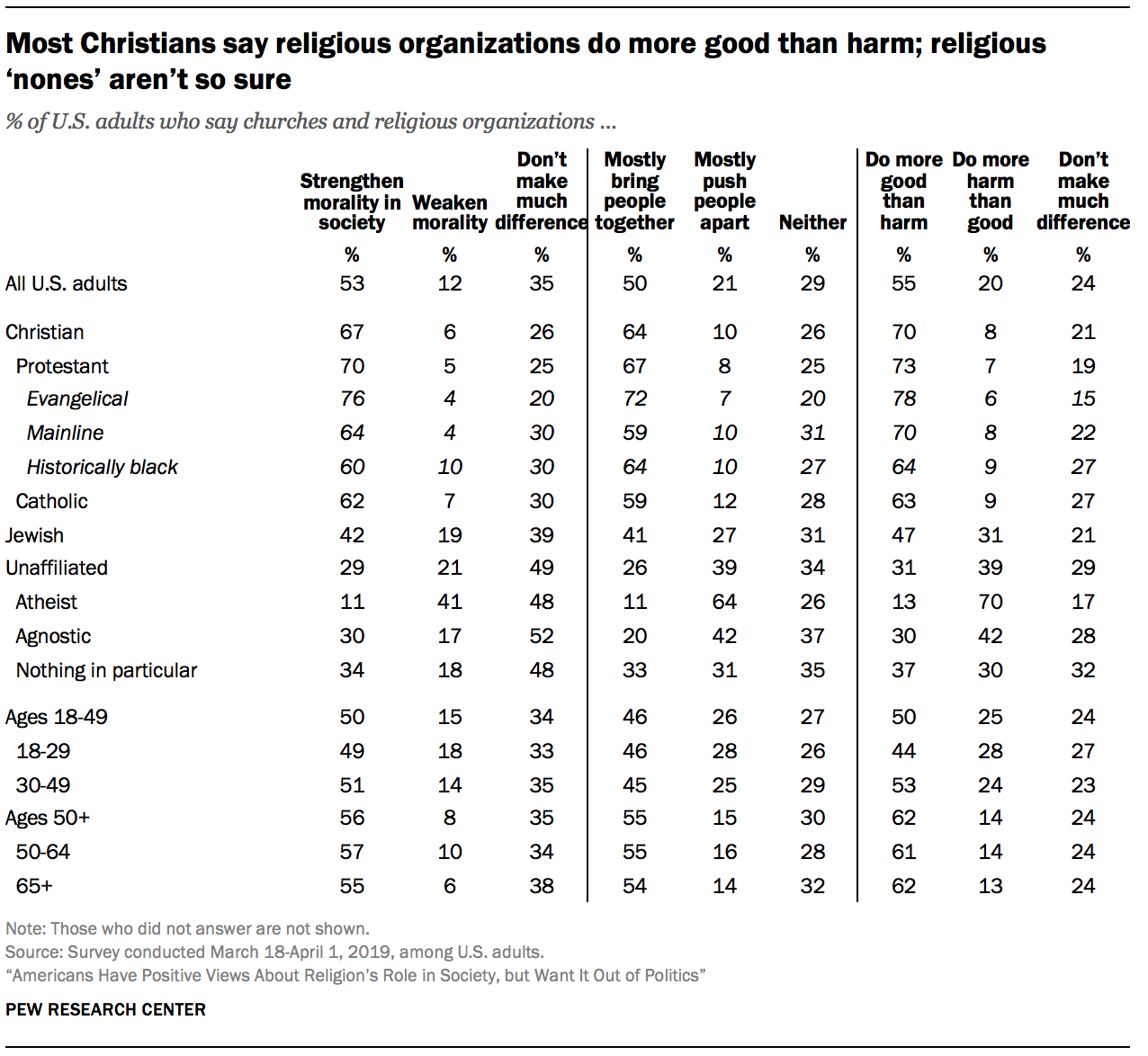
Majority of U.S. adults say religion is losing its influence
A large majority of U.S. adults (78%) say that religion is losing influence in American life. The consensus among both men and women and those over and under age 50 is that religion’s influence has decreased. Most black and Hispanic adults also say this, though they are less likely than white adults to say that religion’s influence is in decline.
But while people from a variety of demographic and religious groups agree that religion’s influence is waning, there is less agreement as to whether this is a good thing or a bad thing. Most Christians, especially evangelicals, lament religion’s declining influence in American life. Jews, however, are more divided; 35% of Jews say it is a bad thing that religion’s influence is declining, but 25% say this is a good thing and 22% say it makes little difference. Most self-described atheists (71%) say it is a good thing that religion’s influence is declining, as do 46% of agnostics.
White and black Americans are more likely than Hispanic adults to say the decline of religious influence in American life is a negative development, and people over 50 are more likely than their younger counterparts to share this sentiment.
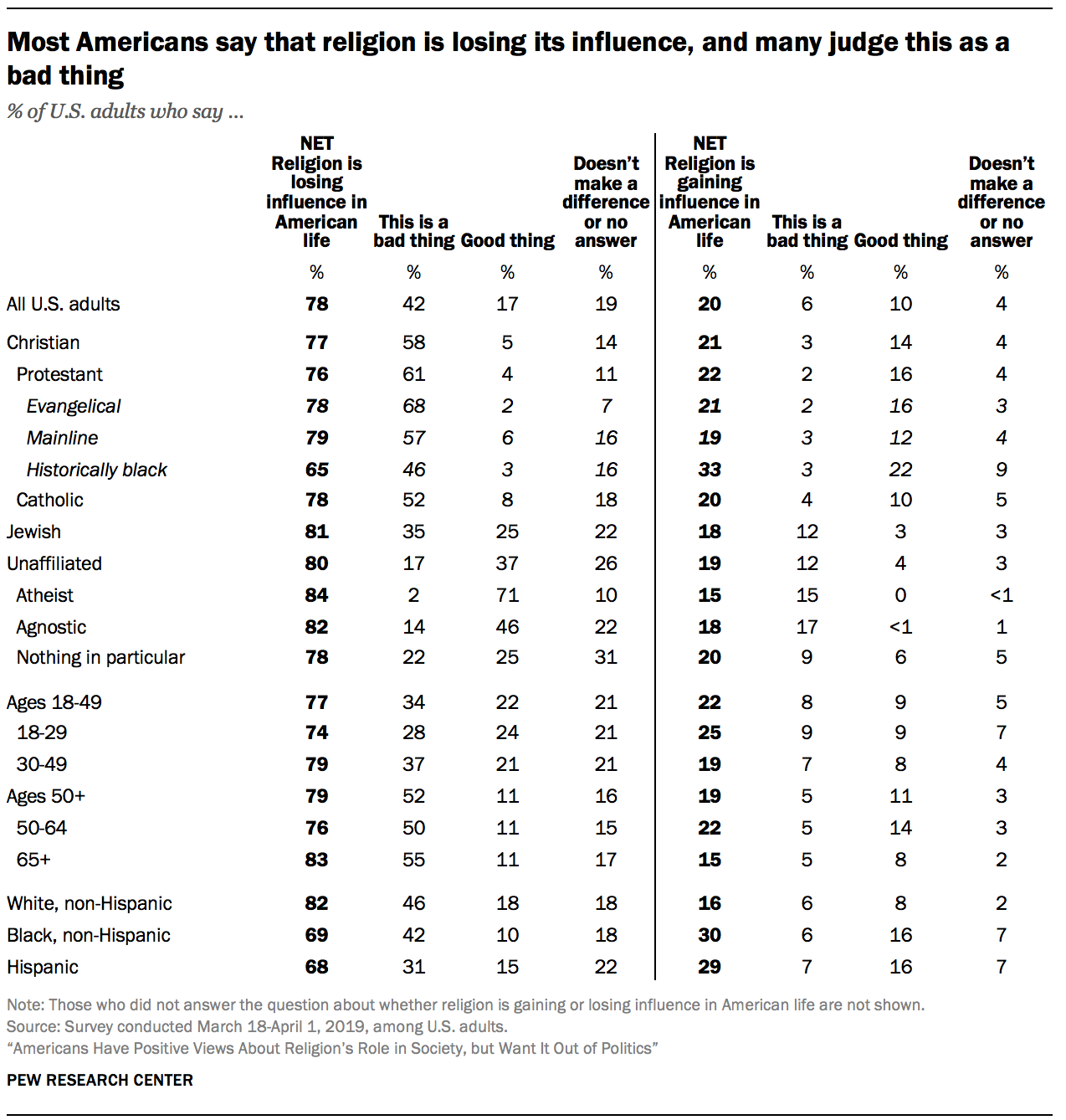
Majorities of Americans want houses of worship out of political matters
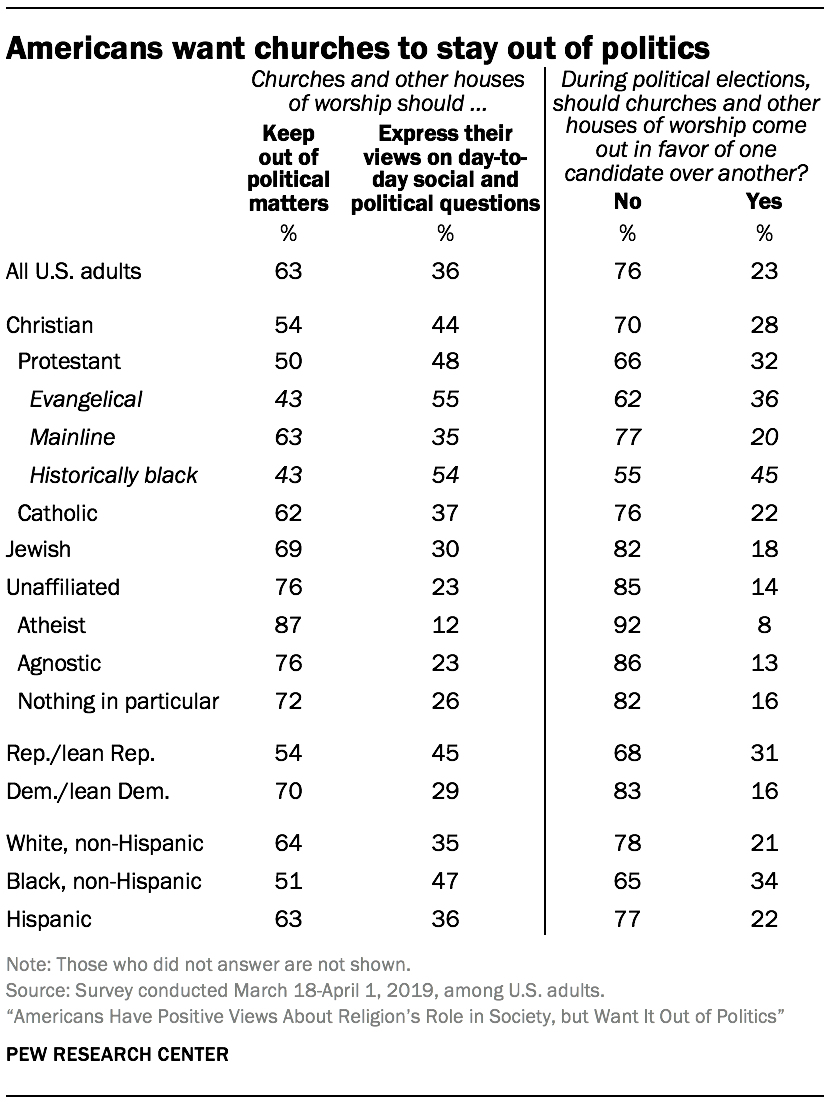
More than six-in-ten U.S. adults believe that churches and houses of worship should keep out of political matters (rather than express their views on day-to-day social and political questions), and fully three-quarters say they should not come out in favor of one candidate over another during elections.
Jews and the religiously unaffiliated are more likely than Christians to oppose political activity by religious organizations. Even among Christians, however, seven-in-ten say churches and other houses of worship should refrain from endorsing candidates for political office, and more than half (54%) say churches should keep out of political matters (rather than express their views on day-to-day social and political questions).
Democrats and those who lean toward the Democratic Party are more likely than Republicans and Republican leaners to say religious organizations should steer clear of politics. But both groups express more opposition to political involvement by churches than support for it.
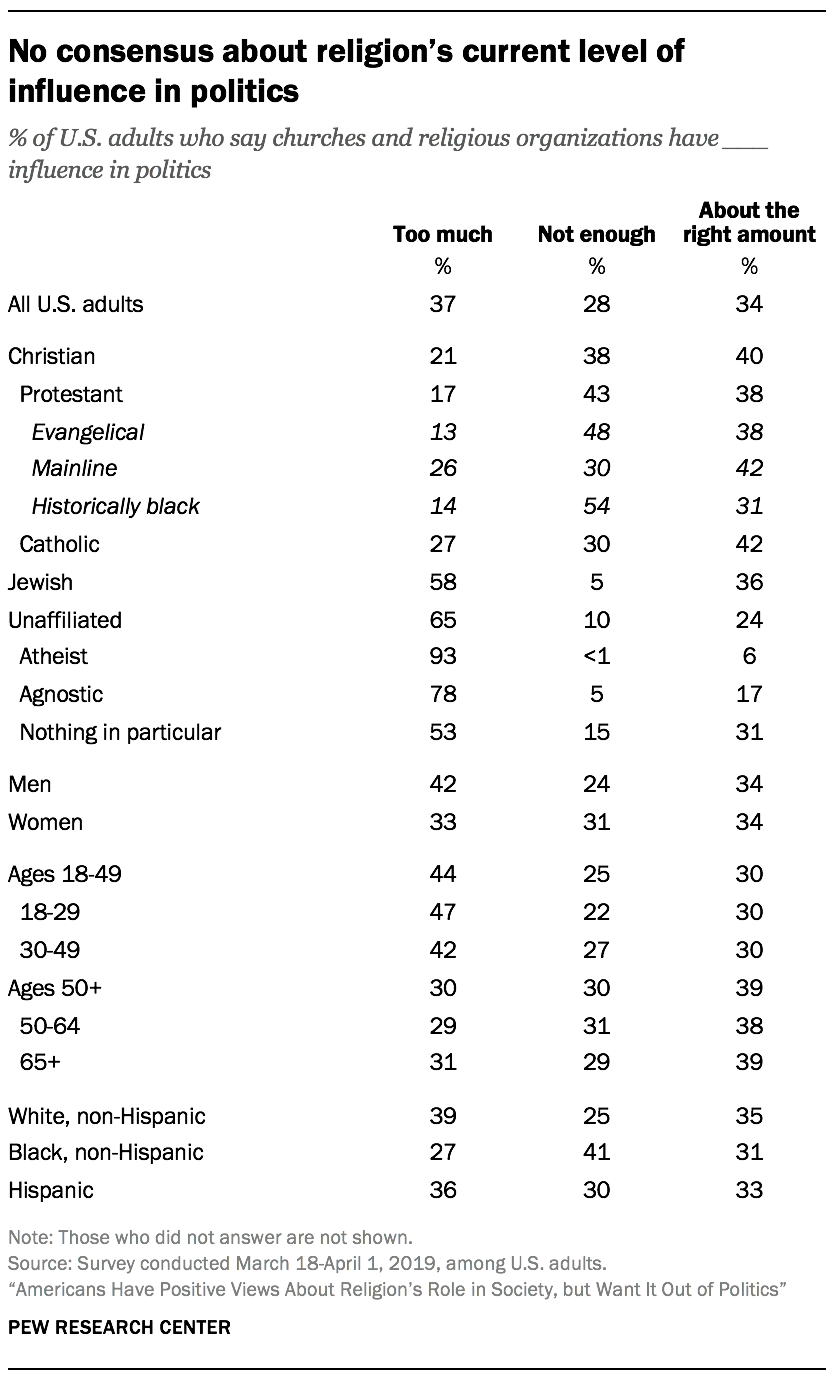
The survey also shows that 37% of U.S. adults say religious organizations have too much influence in politics, while fewer (28%) think these organizations do not have enough influence in politics. About a third (34%) say churches have about the right amount of political influence.
Atheists (93%), agnostics (78%), Jews (58%) and those who say their religion is “nothing in particular” (53%) are most likely to say religious organizations have too much influence in politics. At the other end of the spectrum, Americans affiliated with historically black Protestant denominations are among the most likely to say that religious groups do not have enough influence in politics, with 54% expressing this view. And a plurality of evangelical Protestants (48%) share the opinion that religious organizations do not have enough influence in politics.
U.S. adults under age 50 (44%) are more likely than those ages 50 and older (30%) to say that religious organizations have too much influence. And men are more inclined than women to believe that religious groups have too much political influence (42% vs. 33%).
Most atheists, agnostics and Jews say religious conservatives have too much control over GOP; most evangelicals say nonreligious liberals have too much sway over Democratic Party
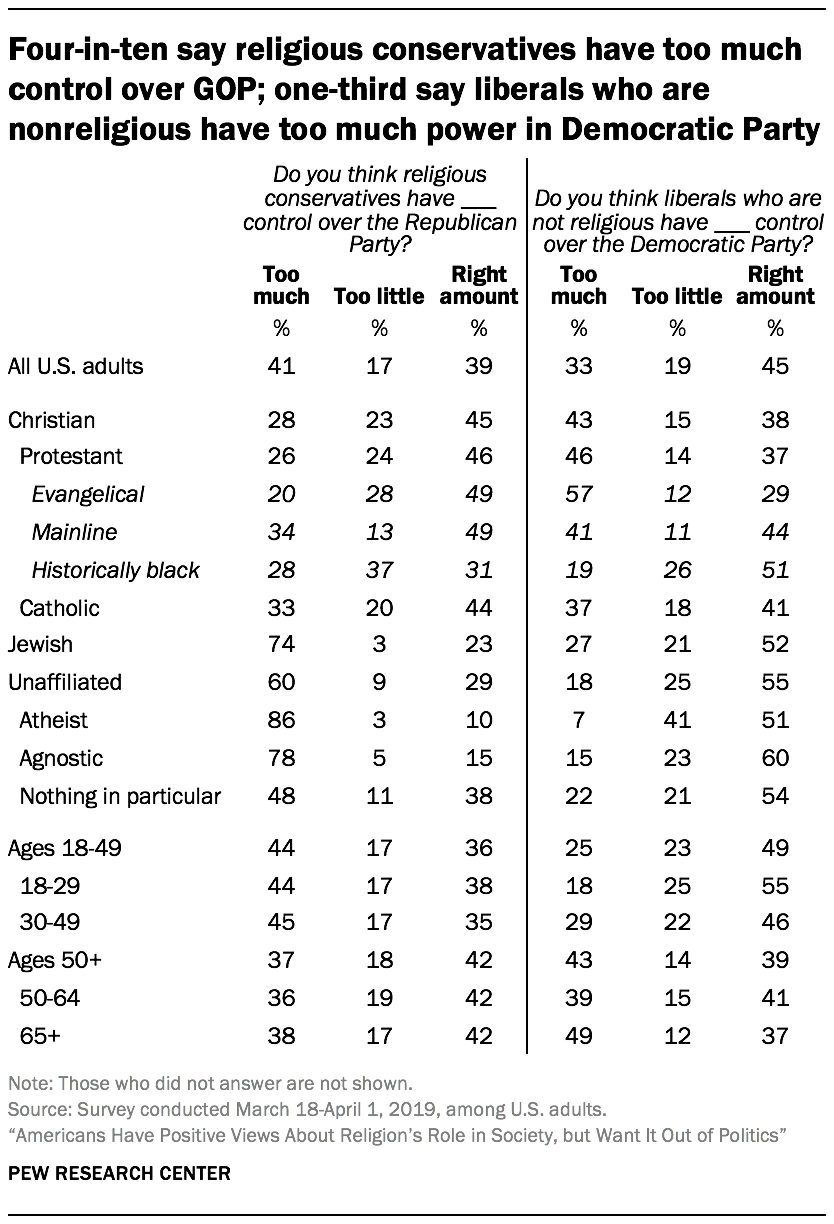
Four-in-ten U.S. adults say religious conservatives have too much control over the Republican Party. This view is especially common among self-described atheists (86%), agnostics (78%) and Jews (74%); among Christians, the prevailing opinion is that religious conservatives have “about the right amount” of control over the GOP.
One-third of U.S. adults say liberals who are not religious have too much control over the Democratic Party. Roughly six-in-ten evangelical Protestants think nonreligious liberals have too much sway in the Democratic Party, while half or more of the religiously unaffiliated (55%), Jews (52%), and those in the historically black Protestant tradition (51%) say nonreligious liberals have an appropriate level of control over the Democratic Party.
Adults under 50 are more likely than older Americans to say religious conservatives have too much influence over the GOP (44% vs. 37%). Meanwhile, those ages 50 and older are much more likely than younger adults to say nonreligious liberals have too much power over the Democratic Party (43% vs. 25%).
Republicans see Democratic Party, professors, media as unfriendly to religion
The survey asked Americans whether a variety of U.S. institutions, including both major political parties, are friendly, unfriendly or neutral toward religion. While just over half of Americans view the Republican Party as friendly toward religion, the prevailing view is that the Democratic Party is neutral toward religion.
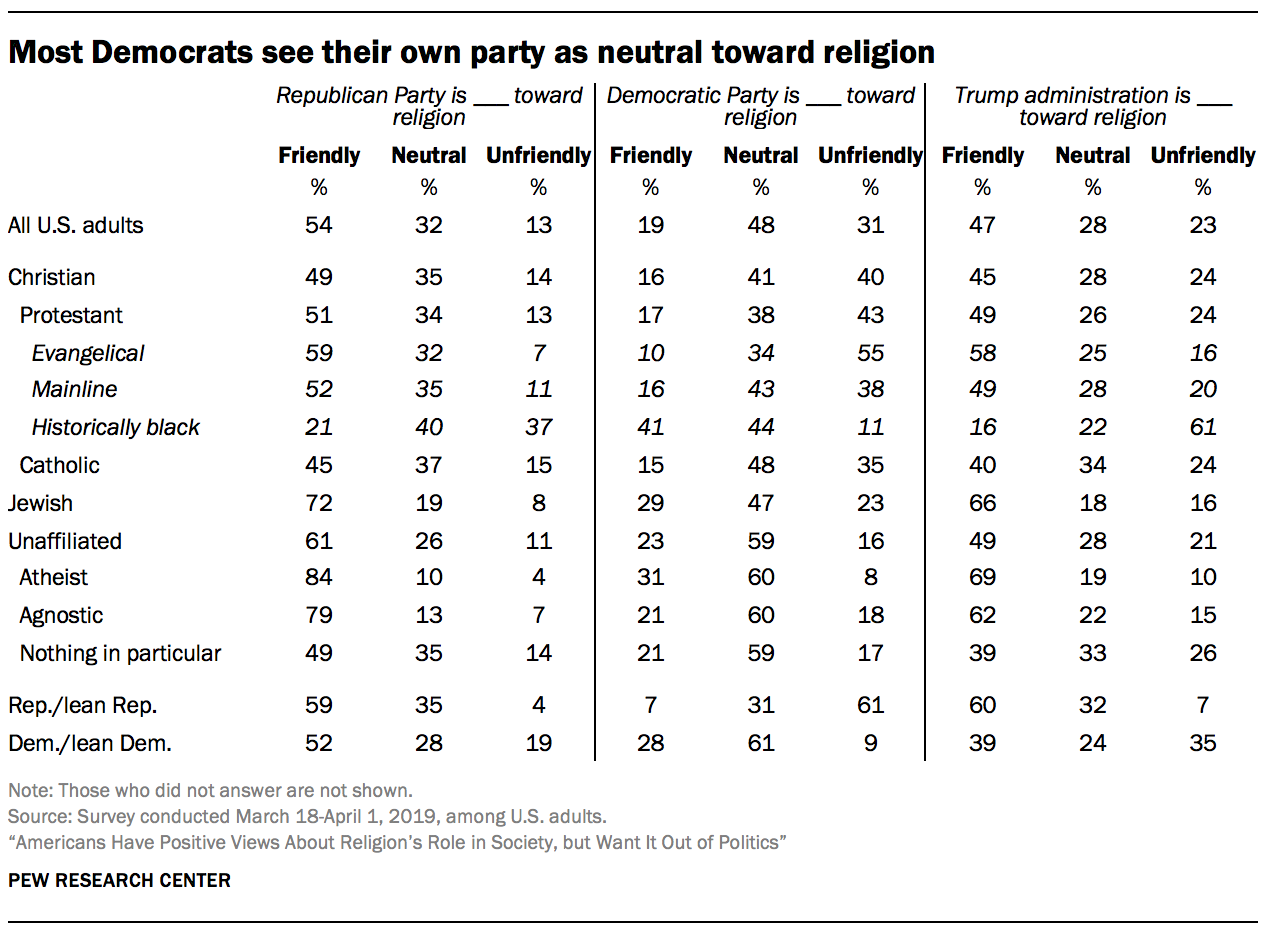
Sentiments on these questions differ by respondents’ own party affiliation: Nine-in-ten Democrats (and those who lean toward the Democratic Party) say their own party is either friendly (28%) or neutral (61%) toward religion, and majorities among Democrats also view university professors and the news media as neutral toward religion. By contrast, approximately six-in-ten Republicans and Republican leaners say the Democratic Party, professors and journalists are unfriendly toward religion.
In addition, nine-in-ten Republicans view the Trump administration as either friendly (60%) or neutral (32%) toward religion. But fully a third of Democrats say the White House is unfriendly toward religion (35%).
The survey also shows that majorities of evangelical Protestants – most of whom identify with or lean toward the Republican Party – think that the Democratic Party, professors and journalists are unfriendly toward religion. At the same time, about six-in-ten evangelical Protestants think the GOP and the Trump administration are friendly toward religion.
Among a few largely Democratic subgroups, most atheists (69%), Jews (66%) and agnostics (62%) say the Trump administration is friendly toward religion, while most members of the historically black Protestant tradition (61%) take the opposite position, saying the White House is unfriendly toward religion.
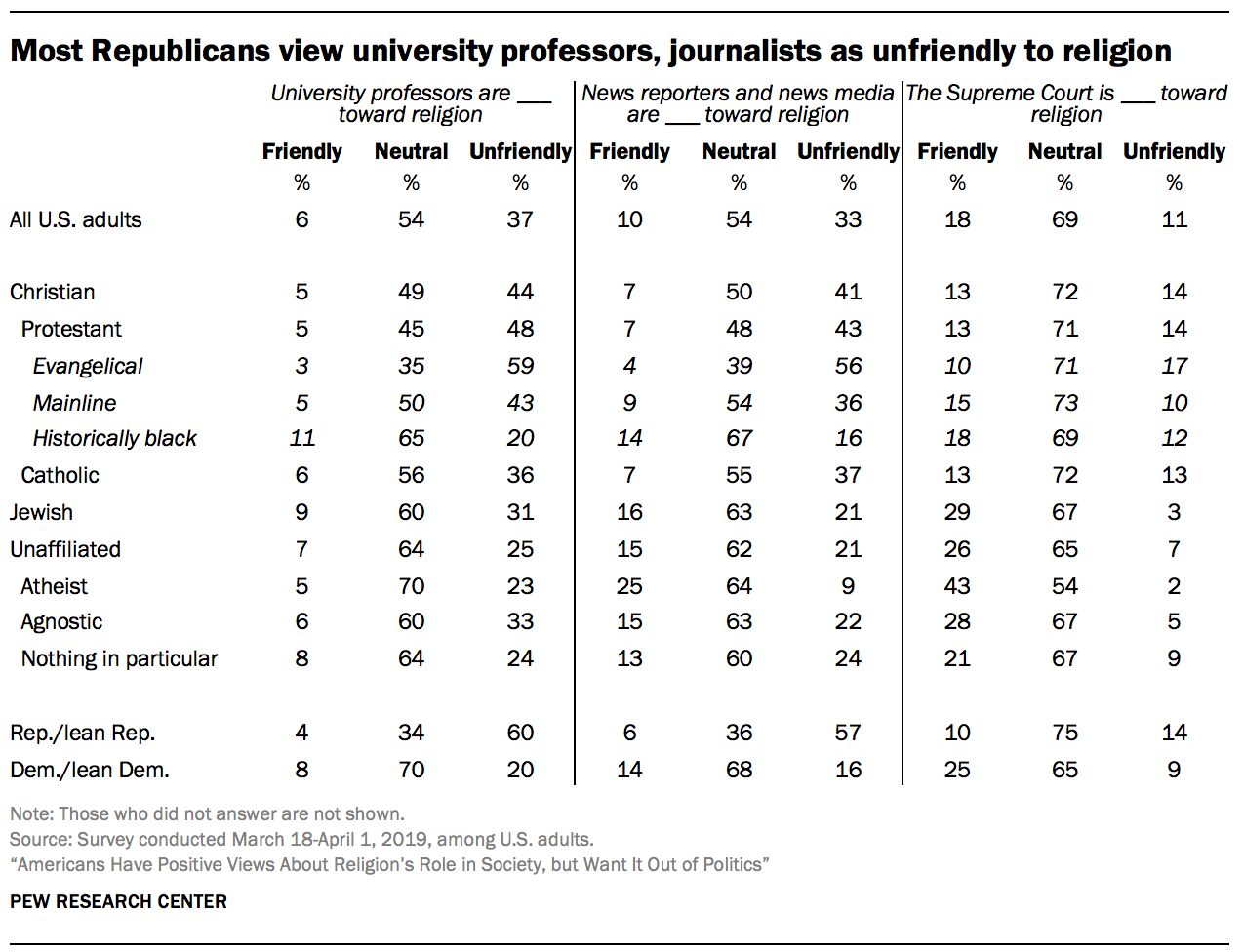
Most people in both political parties view the Supreme Court as neutral toward religion. This is also the majority view across religious groups, although atheists are more likely than others to say the high court is friendly toward religion. Atheists also overwhelmingly see the Republican Party as friendly toward religion (84%).




